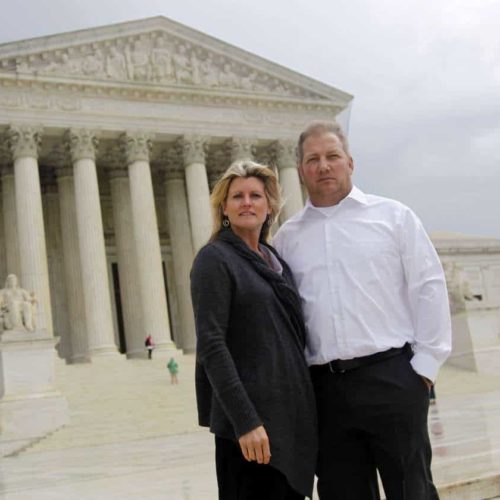Introduction
Mitt Romney railed against the “Obama EPA” and “how the Obama government interferes with personal freedom” — using as his example an EPA action taken in 2007, under President George W. Bush.
Furthermore, it was a Republican-nominated federal judge who made the initial ruling — in EPA’s favor — that was overturned recently by the Supreme Court.
At issue was a longstanding Environmental Protection Agency precedent regarding a property owner’s right to challenge an EPA compliance order in court, a policy that had been upheld in at least four other court challenges over the last two decades.
Romney outlined the case during an address to the National Rifle Association on April 13.
Romney, April 13: “Mike and Chantell Sackett have seen firsthand how the Obama government interferes with personal freedom. They run a small business in Idaho. They saved enough money to buy a piece of property and build a home. But days after they broke ground, an EPA regulator told them to stop digging. The EPA said they were building on a wetland. But the Sackett’s property isn’t on the wetlands register. It sits in a residential area. Nevertheless, the EPA wouldn’t even let them appeal the decision. Fortunately, the Constitution confronted the Obama administration: The Supreme Court ruled unanimously for the Sacketts and against the Obama EPA.”
The Sacketts purchased a vacant lot in a residential subdivision in 2005 with the intent of building a new home on it. The controversy erupted in the spring of 2007, shortly after the Sacketts began to fill in the property with gravel in preparation for building a foundation for their new home. Officials with the EPA arrived and ordered construction workers to halt, saying they were building on wetlands. The EPA threatened to fine the couple up to $32,500 a day for violating the Clean Water Act if they didn’t restore the small wetlands by removing the gravel.
The Sacketts tried to sue, arguing there were no protected wetlands on the property. But a federal judge, Edward Lodge, ruled in the fall of 2008 (when George W. Bush was still president) that they were not entitled to a hearing on their appeal of the EPA’s compliance order, at least not until the EPA went to a judge to seek enforcement of the order. Lodge was recommended by Republican Idaho Sen. James McClure to be a U.S. district judge, and he was nominated by President George H.W. Bush. Lodge’s ruling was later upheld by the U.S. 9th Circuit Court of Appeals in 2010.
The case drew the attention of groups such as General Electric, the American Petroleum Institute, the National Association of Home Builders and 10 states, all of which filed court briefs in support of the Idaho couple.
Environmental groups warned that a ruling in favor of the Sacketts could allow corporate polluters to jam up the EPA in court while continuing to violate federal regulations. But during a Supreme Court hearing, one justice called the EPA’s conduct “outrageous” and another labelled it “high-handedness.”
In March, the Supreme Court ruled unanimously in favor of the Sacketts that property owners are entitled to a hearing to challenge an EPA compliance order. The Supreme Court specifically did not, however, weigh in on the underlying issue about whether there are wetlands on the Sacketts’ property and whether the couple violated the Clean Water Act. The Sacketts will now be given an opportunity to argue that issue in a federal court in Idaho.
“It’s a victory, but just Step 1,” said Damien Schiff, an attorney for the conservative Pacific Legal Foundation, which represented the Sacketts for free, in a phone interview with FactCheck.org.
Romney largely got the facts of the case correct, Schiff said, but he was off-base when singling it out as a problem of the Obama administration.
“I think it’s fair to say the problem is the EPA, writ large, not so much an Obama administration or Bush administration,” Schiff said.
It was a case that was begun by the EPA under the Bush administration, and it continued under the Obama administration. But that doesn’t let the Obama administration off the hook, he said.
“I’m sure that the Obama administration, if they had wanted to, could have ended the enforcement case a long time ago, and they opted not to,” Schiff said.
Of course, the same thing could be said about the Bush administration.
At issue was an EPA policy that has been challenged and upheld repeatedly over the last 20 years. In fact, there have been at least four challenges in federal circuit courts similar to the Sacketts’ and in every case, the circuit court sided with the EPA, ruling that landowners were not entitled to an immediate hearing regarding a compliance order (Laguna Gatuna Inc. v. Browner, 1995, 10th Circuit; Southern Ohio Coal Co. v. the Office of Surface Mining Reclamation and Enforcement, 1994, 6th Circuit; Southern Pines Associated v. U.S., 1990, 4th Circuit; and Hoffman Group Inc. vs EPA, 1990, 7th Circuit).
We’re not offering any judgments about the proper reach of wetlands regulations, or what EPA did in this case. But this wasn’t solely an “Obama EPA” battle, as Romney said. It was an enforcement action initiated by the EPA under the Bush administration, and a legal dispute over a ruling made by a Republican-appointed federal judge during the Bush administration. Moreover, it was a ruling that had been reached at least four times by other federal courts over the last two decades.
– Robert Farley

Join the conversation
Show Comments